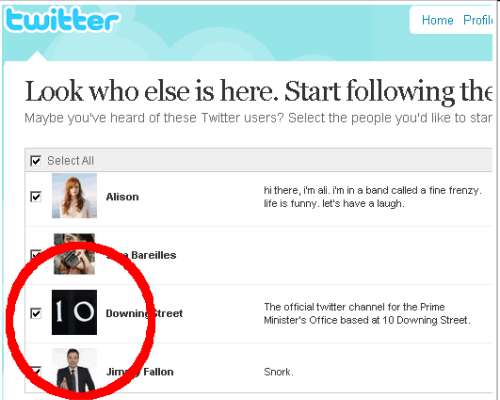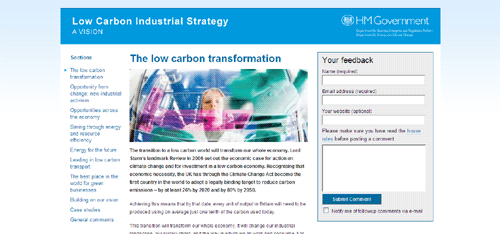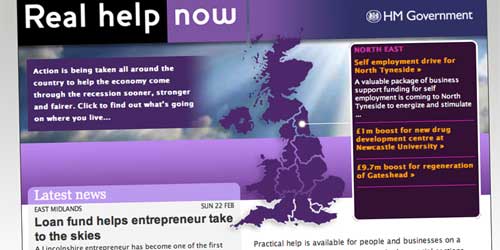Downing Street’s remarkable Twitter popularity reaches new heights today, with the number of followers passing the 200,000 mark. But as some of you may know, an explanation has finally emerged courtesy of Matt Wardman – which should hopefully calm some of the general excitement I’m seeing around Whitehall.
At some point in January, so it turns out, Twitter began suggesting possible friends to new registrants… and Downing Street was one of the lucky few who made the cut. It’s my understanding that they were chosen ‘on merit’, as an example of a famous name making interesting use of the service; they didn’t ask for this prestigious position, and I don’t even think they were notified about it.

So suddenly, unexpectedly, their follower count began surging upwards. But of course, with so many ‘industry people’ already being Twitter users, none of us spotted this new matchmaking stage in the sign-up process. So perhaps it’s not the new dawn of popular political engagement that it might have seemed.
Now, I still see it as an unquestionably good thing. It doesn’t really matter how people found out about the account. And it doesn’t really matter if it’s a ‘tick this box’ or ‘untick this box’ scenario. (Speaking of which, I genuinely don’t know which it is… can someone enlighten me?) People are still opting into – or at least, not opting out of – a government ‘mailing list’. Even if they’re not really listening, they’re certainly hearing… and that’s more than a good start.
I don’t even think it matters if a large proportion are outside the UK (although again, I don’t know if the list of suggestions is geo-targeted). The messages may not be directly relevant to a foreign audience, but they certainly present the UK government as forward-thinking in the online space. The FCO would call that ‘public diplomacy’.
What Matt’s revelation does show is that @downingstreet is a fortunate exception. It demonstrates an interest, certainly, but a passive interest, rather than anything proactive. Other government initiatives simply will not receive Twitter’s special blessing as No10 did; and hence, will not receive anything like the same level of interest. Sorry to disappoint, guys.
That isn’t to do down the role that Twitter can play in (much as I hate the term) stakeholder engagement. You’ll just have to work at it, like any other Twitterer, to build your sphere of influence. There may only be a couple of hundred people interested in tweets on a given project; but if it’s the right couple of hundred people, the number doesn’t matter. Think quality, not quantity.
But it does suggest one possible use for the @downingstreet account: introducing people to other HMG activity on Twitter – and elsewhere online. It would be very interesting to see how much traffic a tweeted link could generate, for example. Time for a bit of bit.ly, gang?

